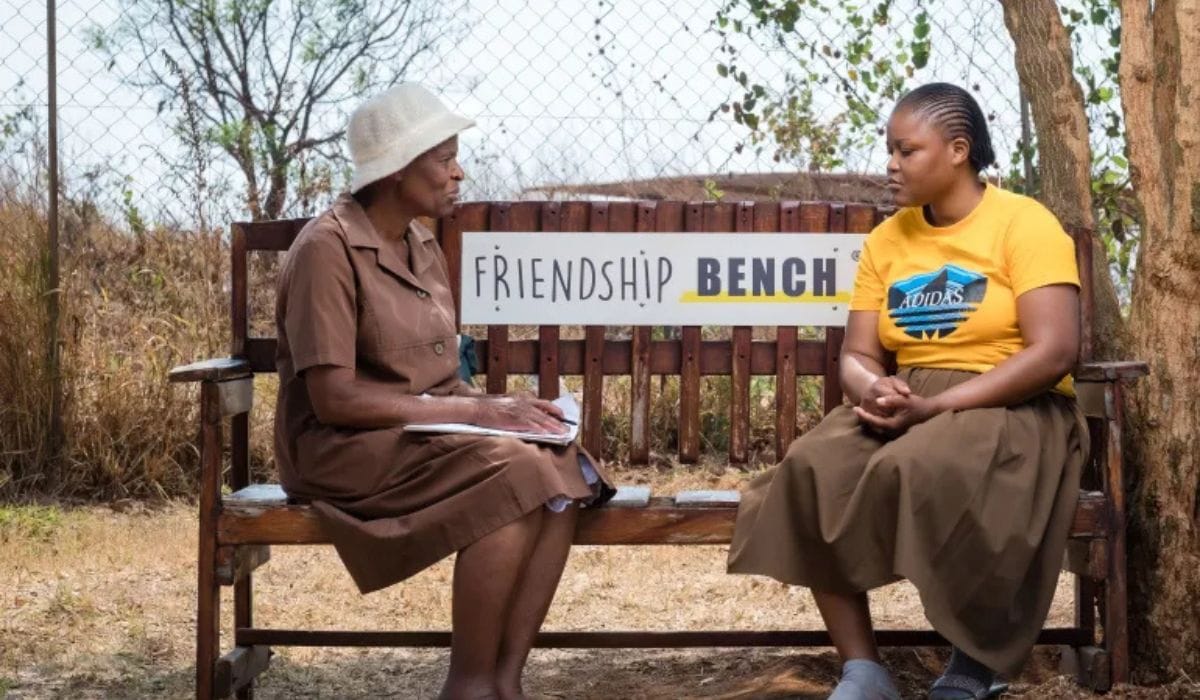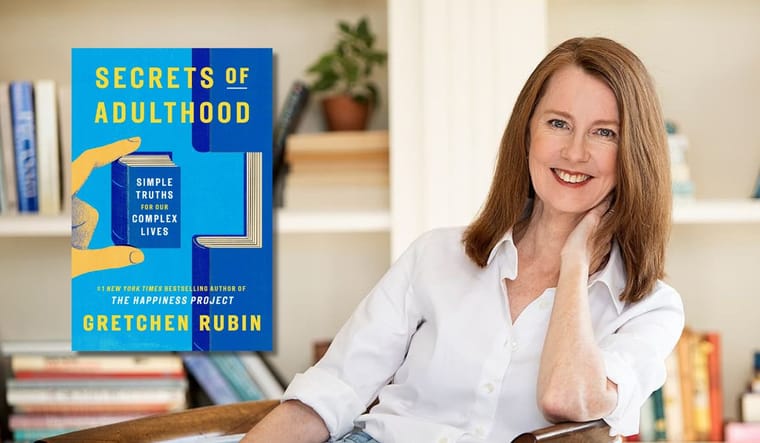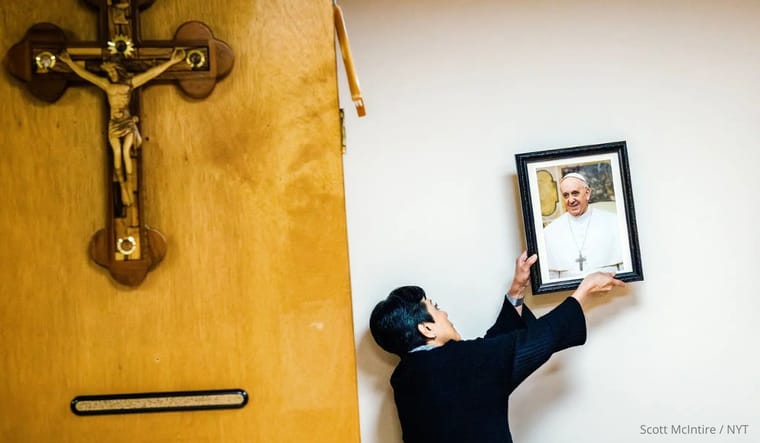Here’s How Dr. Dixon Chibanda and 14 Grandmothers Created “The Friendship Bench” and Inspired a Mental Health Revolution
More than 20 years ago, psychiatrist Dr. Dixon Chibanda witnessed a heartbreaking problem in his native Zimbabwe: people near and far were suffering from depression and anxiety but could not get the support they needed. At the time, Zimbabwe had only 10 psychiatrists to service its population of 13 million. There had to be a way to bridge this gap, thought Dr. Chibanda.
Then it dawned on him: the grandmothers.
Dr. Chibanda began training 14 grandmothers, all of whom volunteered, in basic talk therapy skills. The elders brought these skills to underserved communities throughout Zimbabwe. They provided listening ears to people, meeting them in public places. Thus, the Friendship Bench project was born.
A mission and a movement, Friendship Bench has grown incredibly. Dr. Chibanda and his team have trained more than 600 grandmothers and counting in Zimbabwe. And communities across the globe, from Zanzibar to the UK to the US, have also adopted the team's approach. It's a heartfelt and needed endeavor, considering how hundreds of millions across the globe are suffering and seeking support and community.
Dr. Chibanda tells of his revolutionary journey in his new book, The Friendship Bench: How Fourteen Grandmothers Inspired a Mental Health Revolution, which he shares more about with The Sunday Paper.
What's so compelling about this project is not only how it makes support so accessible but also how it illuminates our elders' wisdom and the ability for us all to make a difference.
"I'm hoping to convey that simple message that each one of us has a role to play," Dr. Chibanda tells us. "I want people to know that pain is inevitable, but so is healing, and this is an entry point towards healing."
A CONVERSATION WITH DIXON CHIBANDA, MD
At its core, tell us what The Friendship Bench is about and why the world needs this mission today.
Human beings need connection. Because when human beings connect, they thrive. Unfortunately, when you look at the technological development of humans today, it is amazing, but when it comes to how we connect with each other, it's almost like we're going backward., That is really what this this book is about: it's about the power of healing through community and how connection is essential for mental well-being.
At a deeper level, it's about the wisdom of our community elders and how every one of us can benefit from having a strong relationship with a community elder. You know that sagacious older friend who has seen and done it all, those who carry the battle scars of life with dignity and grace. We can learn a lot from them, especially now that the global population of folks 65 and above is growing. In the next 10 years, we will have over a billion people aged 65 and above. Imagine all that wisdom that we could tap into at the community level!
Speaking of that intergenerational spirit, why is it so beneficial for people of different age groups to spend time together?
When you look at the young population today, they are extremely tech-savvy. When you look at the grandmothers at Friendship Bench, they are not so tech-savvy, but they are grounded in community. That's where that intergenerational connectedness comes in. You have these young people who can equip these older folks to make it easier for them to navigate the digital space, and then you have the grandmas who help the younger people to be more grounded and have this sense of belonging. And that brings up a sad statistic: Suicide is now a leading cause of death among young people, and it's largely because of that loss of connection and grounding that a lot of young people are so desperately looking for.
That suicide statistic is a grave truth here in the United States.
It's a global epidemic. As most researchers in global mental health will say, when it comes to mental health and meeting the needs of communities, all countries are developing countries. Gone are the days when we used to say the countries in the Global South need more mental health care and attention than countries in the Global North. I spend a lot of time in the United Kingdom, where you can wait anything between three to six months to see a psychiatrist or a clinical psychologist. And seeing from the interaction we've had with the USA, it's also not easy to see a psychiatrist when you need to see one, and you've got to have very good medical insurance, which your average person struggles to have.
These barriers bring up the warmth and accessibility aspects of the Friendship Bench. How do you credit these factors to its success?
What I have learned over the years of doing this work is when we create space in our communities for people to feel comfortable with being vulnerable, that's when healing begins. Whether it's on a bench, in a coffee shop, or in a school ground, when you create that space, healing truly begins. And the most important thing about healing is you don't need to be trained as a psychiatrist or a psychologist. You do need some basic principles, but every human being has an inert ability to express empathy given the right circumstances and the right environment.
At Friendship Bench, we describe expressed empathy as the ability to make people feel respected and understood. Every human being can be equipped with how to do that, including using non-verbal communication like silence, eye contact, and physical posture. We harness all those skills in our first-level training. The grandmothers used the *Shona term Kuvhura pfungwa, which in English means opening up the mind. According to the grandmas, when we make it possible for people to open up their minds, healing begins. But for people to be able to open up their minds, we have to create the space for that to happen.
*[Editor's note: Shona is a language of the Shona people of Zimbabwe.]
For those who want to get involved, how is The Friendship Bench expanding globally?
What we have done over the past couple of years at Friendship Bench is develop what we call Friendship Bench in a Box, which is really a DIY toolkit that will enable anyone anywhere in the world to start a Friendship Bench, whether they are simply wanting to start it at level one, which is connecting people and hearing stories, or they want to go deeper and learn how to actually identify those who may need to be referred to a psychiatrist or a clinical psychologist. That deeper phase of the training is around equipping people to provide some basic talk therapy.
The biggest selling point here is that with level one, we're equipping people with the skills to connect, and this is what the movement is all about. We want to make it possible for people interested to be equipped with the lessons we've learned over the last 20 years of doing this work. And in doing this, we are going to create a global community. Because what I strongly believe we really need today in the world is a critical mass of like-minded people to spread the word of love. There's a lot more that connects us as human beings than divides us. This has been one of the key lessons I've picked up from taking Friendship Bench to different parts of the world.
Dixon Chibanda, MD, is the founder of the Friendship Bench, a professor of psychiatry at the University of Zimbabwe and the London School of Hygiene and Tropical Medicine, the Director of the African Mental Health Initiative (AMARI), and a founding member of the Coalition for Scaling Mental Health. You can learn more and access information about getting involved in Friendship Bench at friendshipbench.org.
Please note that we may receive affiliate commissions from the sales of linked products.



